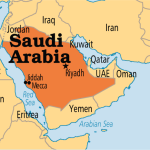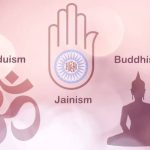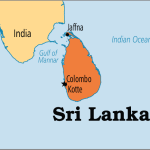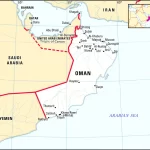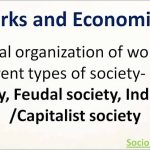
• The Cooperation Council for the Arab States of the Gulf, also called the Gulf Cooperation Council (GCC), was set up when Bahrain, Kuwait, Oman, Qatar, Saudi Arabia, and the United Arab Emirates (UAE) signed an agreement on May 25, 1981, in Riyadh, Saudi Arabia, because of their special ties, close proximity, similar political systems based on Islamic beliefs, shared destiny, and common goals. Arabic is the main language. The GCC’s founding document made it clear how important it is to find ways to bring Arab states together.
• India sees the Gulf area as part of its “extended neighbourhood” and “natural economic hinterland. “India’s trade with the GCC has grown a lot, making it clear that the GCC has become an important trading partner.
• All of the current member states are monarchies. Qatar, Kuwait, and Bahrain are constitutional monarchies, Saudi Arabia and Oman are absolute monarchies, and the United Arab Emirates is a federal monarchy.
• Some of the fastest-growing countries in the world are in the GCC. Its total nominal gross domestic product is $1.638 trillion.
Table of Contents
- 1 Goals of the Gulf Cooperation Council (GCC)
- 2 Role of the GCC today:
- 3 The Gulf Cooperation Council (GCC) and India
- 4 What the GCC means to India
- 5 Where we work together
- 6 Political
- 7 Economic
- 8 Safety and Terrorism
- 9 How important is the India-GCC FTA?
- 10 Free Trade Agreement (FTA):
- 11 India and the GCC both face problems.
- 12 Conclusion
Goals of the Gulf Cooperation Council (GCC)
• Coordination, integration, and interconnection between Member States in all areas, as well as strengthening ties between their people.
• Creating similar rules in areas like the economy, finance, trade, customs, tourism, law, and administration, as well as promoting scientific and technical progress in industry, mining, agriculture, water and animal resources, and other areas.
Structure:
The GCC is made up of six main parts that do different things, like planning meetings and putting policies into action. These parts are the Supreme Council, the Ministerial Council, the Secretariat-General, the Consultative Commission, the Commission for the Settlement of Disputes, and the Secretary-General. The Secretariat is in the Saudi Arabian city of Riyadh.
Role of the GCC today:
• It is not clear if the GCC still has a purpose and role in the area. Even though it was made to make unions stronger, the blockade that Qatar’s neighbours have put in place has mostly made these ideals useless.
• In the past, the Gulf states have had different ideas about a number of things that have happened in the area over the past twenty years. Since the US-led attack of Iraq in 2003, the GCC has also become less important, since the six states have different views on the war and its effects. This has gotten worse since the Arab Spring, a wave of protests that hit the Middle East in 2011.Saudi Arabia is now the most powerful country in the GCC.
What is the Persian Gulf region, and why is it so important? The land around the Persian Gulf is shared by eight countries: Bahrain, Iran, Iraq, Kuwait, Oman, Qatar, Saudi Arabia, and the United Arab Emirates. These countries are major producers of crude oil and natural gas, which is very important to the global economy and to their own prosperity. About two-thirds of the world’s known oil reserves and one-third of the world’s proven natural gas reserves are found in this area. This has made them more important from a strategic point of view. A lot of sea trade goes through the bay, which means there is a lot of traffic in the area.
________________________________________
The Gulf Cooperation Council (GCC) and India
The Gulf Cooperation Council (GCC) is a very important group for India as a whole. The Arabian Sea is the only thing that separates the Gulf from India’s “immediate” area. So, the safety, security, and economic health of the Gulf are very important to India. The GCC and India are both part of the FATF.
What the GCC means to India
• The Gulf is an important part of India’s “extended neighbourhood,” both because it is close to India and because it is a place where India has more interests and is becoming more influential. The GCC has become one of India’s most important trading partners, and it has a lot of promise as an investment partner for India in the future. The GCC’s large oil and gas reserves are very important for India’s energy needs. India gets 42 percent of its oil from the six Gulf Cooperation Council (GCC) states, and three of the top five oil suppliers to India are from the GCC. There are an estimated 7.6 million Indians living and working in the region, especially in Saudi Arabia and the United Arab Emirates. The GCC is India’s largest regional-bloc trading partner, with $104 billion worth of trade between the two in 2017–18. This is more than the trade between India and ASEAN ($81 billion) and India and the EU ($102 billion) in 2017-18.
• Terrorism, piracy, and the rise of other non-state players have made the GCC countries even more important to India in recent decades. India has always seen the Indian Ocean as a vital area, and working together with the Gulf countries on defence would secure India’s hold on the western part of the Arabian Sea, which includes trade choke points like the Strait of Hormuz, the Suez Canal, and the Gulf of Oman, among others.
Where we work together
India’s foreign strategy is based in part on getting along better with the Gulf countries. This is clear from the Indian PM’s “Link West” policy and his recent trips to the UAE and Saudi Arabia. In 2003, at the first-ever India-GCC Political Dialogue, the GCC Chairman said that the UN Security Council should be made bigger and that India should be a member.
Political
• The governments of the GCC countries are friendly to India and to Indians.
• The Prime Minister of India has been given the “Order of Zayed,” which is the UAE’s highest civilian honour, and the “King Hamad Order of the Renaissance,” which is Bahrain’s third-highest civilian honour.
• In the past few years, Saudi Arabia and the UAE have not taken a hostile stance towards India’s internal changes, such as the removal of Article 370’s special status for Jammu and Kashmir.
• The GCC was happy about India becoming a non-permanent member of the UN Security Council (UNSC) in January 2021.
• India promised that food, medicine, and other necessary items would keep going to the Gulf region. Even though there were lockdowns during the pandemic, supply lines from India to the Gulf were not broken.
Economic
• India is very interested in the Gulf Cooperation Council (GCC) states because of its long history with them, its growing imports of oil and gas, its growing trade and investment opportunities, and the fact that about 6 million Indians work in the area.
• India’s economic ties with the GCC have grown steadily, especially as India’s oil imports have risen. During 2012–13, the two-way trade between the two countries was worth USD 158 billion.
• The United Arab Emirates (UAE) and Saudi Arabia are India’s third and fourth biggest trading partners, respectively, and the total trade between India and the GCC countries in 2018-19 was worth USD 121.34 billion.
• Right now, the GCC is India’s biggest trading partner bloc. In the financial year 2021-22, goods traded between the two countries will be worth more than 154 billion US dollars.
• Almost 35% of India’s oil imports come from the GCC, and 70% of India’s petrol imports come from the GCC.
In 2021-22, India bought about $48 billion worth of crude oil from the GCC, and it bought about $21 billion worth of LNG and LPG.
• India’s exports to GCC countries grew by more than 58%, from nearly $28 billion in 2020-21 to about $44 billion in 2021-22.
Safety and Terrorism
• The rise of terrorism and piracy in the Arabian Sea are two important examples of why the two countries must work together.
• The Arab Spring, ISIS, and the Yemen Crisis caused India to worry right away because of the sharp rise in oil prices and the need to get its people out of Libya, Egypt, Iraq, and Yemen.
• Since the 9/11 terrorist attacks changed the security situation in the Gulf area, the GCC is also looking to India as a reliable partner.
• The US is still the only country with the power to keep security and order in the Gulf, but the rulers are looking east to broaden their economic and strategic ties.
• India and the GCC both care about politics and security, so they work for peace, security, and stability in the Gulf area and South Asia.
• The Financial Action Task Force (FATF) is made up of both India and the GCC.
• Saudi Arabia, Oman, Kuwait, and other countries take part in India’s mega multilateral Milan Exercise. However, India also does bilateral drills with most of these countries.
India and Oman hold joint drills every year for all three branches of their armed forces: the Army Exercise “Al Najah,” the Air Force Exercise “Eastern Bridge,” and the Naval Exercise “Naseem al Bahr.” Also, Oman has let the Indian Navy use the Port of Duqm SEZ, which is one of the biggest deep-sea ports in the Indian Ocean.
India and the UAE have both a naval exercise (In-UAE BILAT) and an air force drill (Desert Eagle-II).
How important is the India-GCC FTA?
• In August 2004, in New Delhi, India and the GCC signed a Framework Agreement to improve and grow their economic partnership.
• Trade potential: The GCC region has a lot of promise for trade, and a trade deal would help India sell more goods there.
• Oil and gas reserves: India’s energy needs are very dependent on the GCC’s large oil and gas reserves.
• Good relationships: India gets along well with most of the Gulf countries.
• India can grow its exports because the GCC is a big import market. India can sell more food, clothes, and other things around the world.
As part of a trade deal, a duty cut will help reach that market.
• India needs to come up with a plan to build relationships in many different areas, like renewable energy, water conservation, food security, digital technology, and job development.
Free Trade Agreement (FTA):
A free trade agreement (FTA) is a deal between two or more countries to make it easier for them to import and export goods. Under a free trade policy, goods and services can be bought and sold across international borders with few or no restrictions from the government, such as tariffs, quotas, subsidies, or bans. Trade protectionism and economic isolationism are the opposites of the idea of free trade.
India and the GCC both face problems.
• India hasn’t been able to get a lot of money from Arab countries. Between 2000 and 2014, FDI from the GCC countries stayed the same, at $3.2 billion. This is partly because India doesn’t want to start an Islamic bank, but it’s also because Arab buyers don’t trust the Indian financial market.
• Kuwait Gulf Cooperation Council Pakistan still has a lot of political support in Muslim West Asia, which puts it ahead of India in terms of political support in the area. Oil and gas prices and the rising cost of “war conditions” have caused Arab Gulf economies to slow down. This has led to salary cuts, layoffs, tax increases, fewer job prospects, and the nationalisation of the workforce, which hurts the expatriate community. India has more “soft power” in the region than China and is widely seen as a security partner by Gulf countries. But China has already made quick progress in the Gulf by buying equity stakes in the region’s upstream oil and gas business and entering Arab markets successfully.
• India is a big supporter of Asian countries working together to keep everyone safe. Under a U.S.-led security system, however, Gulf Arab leaders don’t seem very interested in the idea of a shared security system. Also, the Qatar situation shows that the GCC is very split up right now. Even though India has always supported the “two-state solution” to the Palestine issue, its growing security relationship with Israel is also a cause for worry.
Conclusion
• India’s ideas about the Middle East have been confused for a long time by ideological, political, and religious differences. Despite these differences, India should meet with the heads of the Gulf Cooperation Council every year.
• India’s interests in the Gulf are rising, and the region’s politics and security are changing quickly. It would be in India’s best interest to look beyond trade and business and work closely with the GCC in other important areas as well.
• The Gulf area is important to India in terms of its history, politics, economy, security, and culture. The India-GCC Free Trade Agreement (FTA) can make things better between the two countries.
• The GCC region is unstable right now, so India must protect its big economic, political, and demographic interests in the area.



